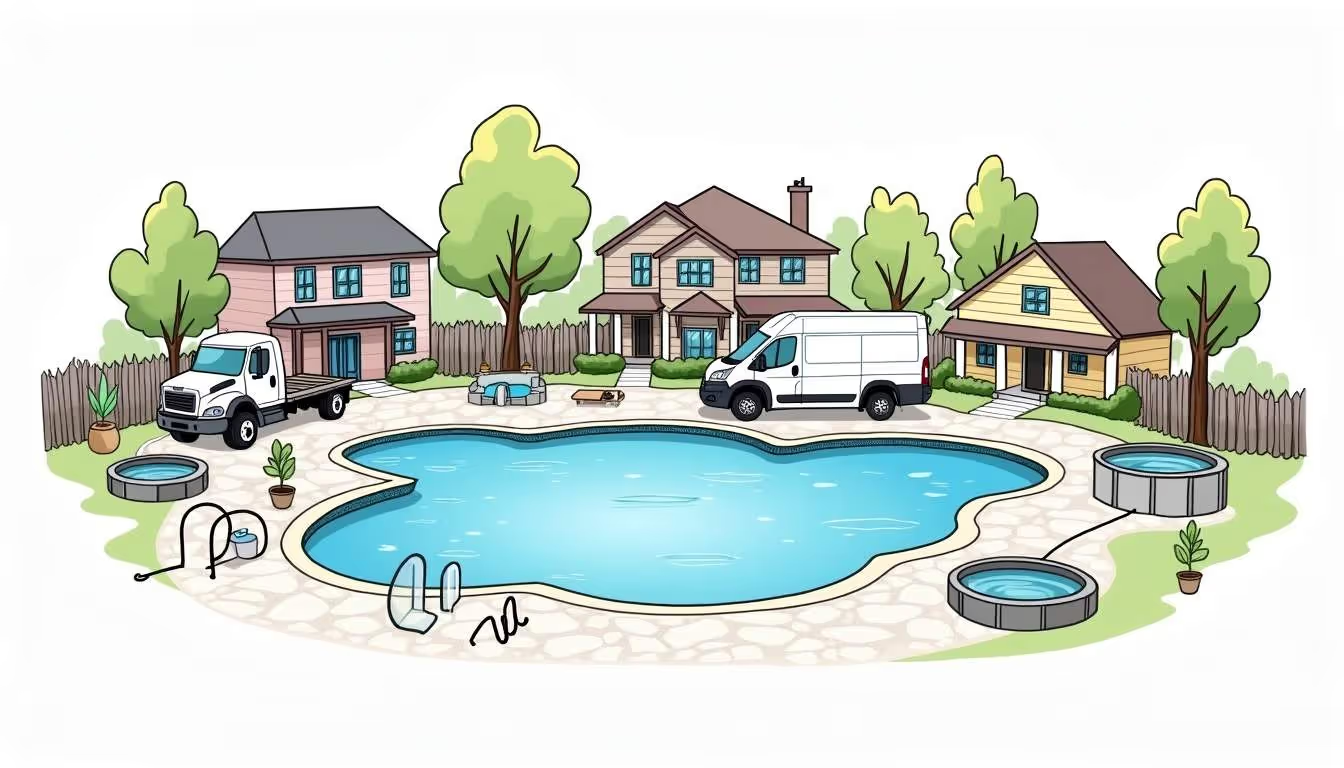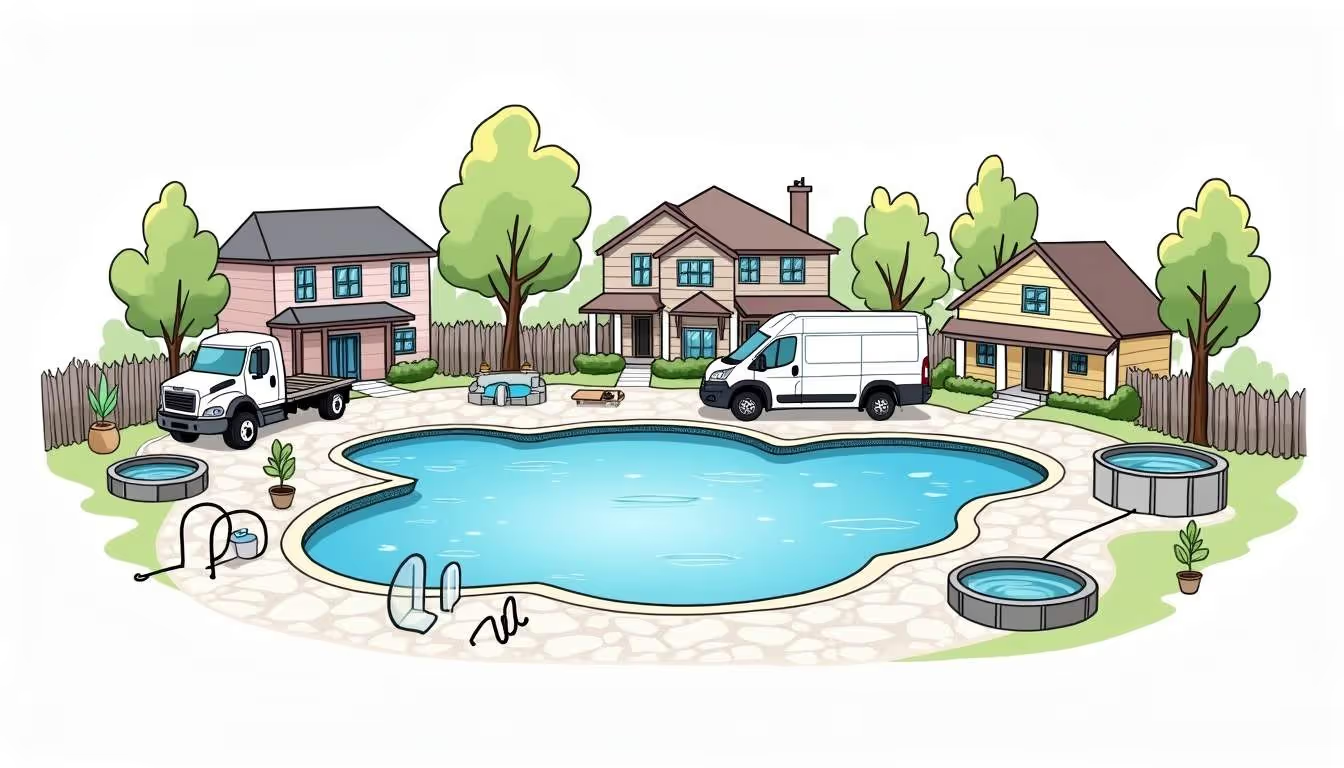Maximizing Pool Business Growth: Strategies for Success
The swimming pool industry continues to flourish, driven by rising consumer interest in residential pools and advancements in pool technology. For pool service companies and pool business owners, tapping into this growth requires more than just technical expertise—it demands smart business strategies, effective marketing, and exceptional customer service. This article explores actionable strategies to maximize growth in the competitive pool business landscape, backed by the latest industry insights.
Understanding the Pool Industry Landscape
The global swimming pool market was valued at approximately $21.8 billion in 2022, reflecting a robust and expanding sector. In the United States alone, there are an estimated 10 million residential in-ground pools, highlighting a vast customer base for pool service providers.

With the average cost of installing a new in-ground pool ranging between $35,000 and $65,000, pool ownership represents a significant investment for homeowners. This creates ongoing opportunities for maintenance, repair, and upgrade services. For instance, the average annual maintenance cost for pool owners is around $960, and repairs such as pump servicing typically cost about $350 every 5 to 7 years.
Recognizing these figures helps pool businesses tailor their service offerings and pricing strategies to meet customer expectations while ensuring profitability. Additionally, the rise in eco-conscious consumers has led to a growing demand for energy-efficient pool systems and sustainable practices. Many homeowners are now opting for solar heating systems, variable-speed pumps, and advanced filtration technologies that not only reduce energy consumption but also lower long-term operational costs. This trend is prompting pool service providers to expand their expertise in green technologies, further enhancing their market appeal.
Furthermore, the increasing popularity of smart pool technology is reshaping the landscape of pool ownership. Smart devices allow homeowners to monitor and control their pool's temperature, chemical levels, and cleaning schedules through mobile applications. This convenience not only enhances the user experience but also opens up new avenues for service providers to offer tech support and installation services. As the industry evolves, staying abreast of these technological advancements will be crucial for businesses looking to maintain a competitive edge in an ever-changing market.
Building a Strong Foundation: Operational Excellence
Streamlining Service Delivery
Operational efficiency is critical for scaling a pool service business. The industry is characterized by relatively low barriers to entry, with startup costs averaging between $10,000 and $20,000. However, to stand out and grow, companies must focus on delivering timely, reliable service.
Industry data shows that top-performing pool service companies maintain an average response time to customer inquiries of less than 24 hours. Rapid response not only improves customer satisfaction but also enhances retention rates, which can reach as high as 85% for well-managed businesses. Additionally, employing technology such as scheduling software and customer relationship management (CRM) systems can further streamline operations, allowing businesses to manage appointments and track customer interactions more effectively. By automating routine tasks, companies can allocate more resources to customer engagement and service quality, ultimately leading to increased customer loyalty and referrals.
Investing in Skilled Workforce and Training
Pool service quality hinges on skilled technicians who can efficiently handle maintenance, repairs, and upgrades. Investing in ongoing training ensures your team stays current with the latest pool technologies and safety standards. This commitment to quality service builds trust and encourages repeat business, which is vital given the pool service industry’s average customer retention rate of around 80% to 85%.
Moreover, fostering a culture of continuous learning within your workforce not only enhances technical skills but also boosts employee morale and job satisfaction. Offering certifications in specialized areas, such as energy-efficient pool systems or advanced water chemistry, can empower technicians to take pride in their work and provide exceptional service. Furthermore, recognizing and rewarding employees for their achievements can create a motivated team that is invested in the company's success. This holistic approach to workforce development not only improves service delivery but also positions your business as a leader in the industry, attracting top talent and discerning customers alike.
Marketing Strategies to Grow Your Pool Business
Targeted Advertising and Digital Presence
Marketing plays a pivotal role in attracting new customers and retaining existing ones. Pool service companies typically allocate about 10% of their revenue to marketing and advertising efforts, equating to roughly $500 per month for many businesses. This investment should be strategically directed towards digital channels such as social media, search engine marketing, and local online directories.
Building a strong online presence with customer testimonials, before-and-after project photos, and educational content about pool care can position your business as a trusted authority. Additionally, local SEO optimization ensures your services appear prominently when potential customers search for pool maintenance or repair in your area. Engaging with your audience through regular posts, interactive content like polls or quizzes, and responding promptly to inquiries can foster a sense of community around your brand. This not only enhances customer loyalty but also encourages word-of-mouth referrals, which are invaluable in the service industry.
Leveraging Customer Retention and Referral Programs
Maintaining a loyal customer base is more cost-effective than acquiring new clients. With an average renewal rate of 70% for annual maintenance contracts, pool businesses benefit significantly from nurturing long-term relationships. Implementing referral programs that reward customers for recommending your services can further boost growth. Offering incentives such as discounts on future services or gift cards for successful referrals can motivate satisfied customers to spread the word about your business.
Regular communication through newsletters or personalized reminders about seasonal maintenance helps keep your brand top-of-mind and encourages ongoing engagement. Additionally, hosting seasonal events, such as pool maintenance workshops or customer appreciation days, can strengthen relationships with existing clients while attracting new ones. These gatherings provide opportunities for customers to connect with your team, ask questions, and learn more about the importance of pool upkeep, all while reinforcing your commitment to exceptional service.
Embracing Technology and Innovation
Adopting Pool Automation Systems
Technological advancements are reshaping the pool industry. The global demand for pool automation systems is projected to grow at a compound annual growth rate (CAGR) of 7.5% from 2023 to 2030. These systems offer customers convenience, energy efficiency, and enhanced pool safety, making them an attractive upsell for service providers.
By offering installation and maintenance of automation technologies, pool businesses can diversify revenue streams and differentiate themselves from competitors. Training your team on these systems ensures seamless service delivery and customer satisfaction. Additionally, integrating smart technology into pool systems allows for remote monitoring and control, enabling homeowners to adjust settings from their smartphones. This feature not only enhances user experience but also promotes energy conservation, as users can optimize heating and filtration schedules based on their preferences and usage patterns.
Utilizing Industry-Leading Software Platforms
Managing scheduling, customer communication, billing, and inventory manually can limit growth. Industry-leading software platforms designed for service companies streamline these operations, freeing up time to focus on expanding your customer base and improving service quality.
Features such as automated appointment reminders, digital invoicing, and real-time technician tracking enhance professionalism and operational transparency. These tools also provide valuable data insights that inform marketing strategies and operational improvements. Furthermore, many of these platforms offer customer relationship management (CRM) capabilities, allowing businesses to track customer interactions and preferences. This data can be leveraged to create personalized marketing campaigns, fostering customer loyalty and encouraging repeat business. By harnessing the power of technology in this way, pool service providers can not only improve their operational efficiency but also build lasting relationships with their clients.
Financial Management and Profitability
Optimizing Pricing and Cost Control
Profit margins in the pool service industry typically range from 15% to 30%, depending on business size and efficiency. Careful pricing that reflects service quality, market demand, and operational costs is essential to maintaining healthy margins.
Regularly reviewing expenses such as equipment maintenance, chemical supplies, and labor costs helps identify opportunities for savings. For example, the average repair cost for a pool pump is about $350 every 5 to 7 years, so proactive maintenance can reduce unexpected expenditures.
Exploring Franchise Opportunities
For entrepreneurs looking to enter the pool service market with an established brand, opening a pool service franchise can be a viable path. Startup costs for franchises range from $50,000 to $150,000, reflecting the value of brand recognition, training, and support.
Franchises often benefit from proven business models, marketing resources, and bulk purchasing power, which can accelerate growth and profitability.
Delivering Exceptional Customer Experience
Prioritizing Customer Satisfaction
Customer satisfaction is a cornerstone of sustainable growth. The pool service industry boasts a 90% customer satisfaction rate, underscoring the importance of quality service and responsiveness.

Listening to customer feedback, promptly addressing concerns, and exceeding expectations build goodwill and foster positive word-of-mouth. This approach not only retains clients but also attracts new ones in a competitive market.
Offering Customized Service Plans
Every pool owner has unique needs based on pool type, usage, and budget. Offering tailored service plans—from basic maintenance to comprehensive care packages—allows customers to choose options that best fit their lifestyle.
Customization enhances perceived value and can increase contract renewals, contributing to steady revenue streams.
Conclusion
The swimming pool industry presents abundant opportunities for growth, fueled by a large and expanding customer base and technological innovations. Pool businesses that focus on operational excellence, strategic marketing, technology adoption, and superior customer experience position themselves for long-term success.

By understanding industry trends and leveraging data-driven strategies, pool service companies can maximize profitability, build loyal customer relationships, and thrive in a competitive marketplace.








